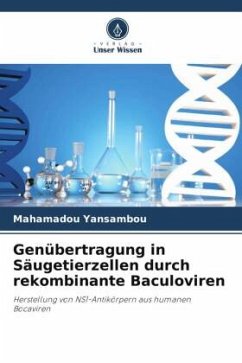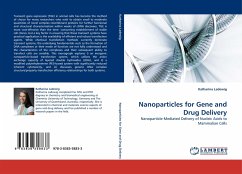
Gene delivery into mammalian cells by recombinant baculovirus
Antibody production of NS1 from Human Bocavirus
Versandkostenfrei!
Versandfertig in 6-10 Tagen
27,99 €
inkl. MwSt.

PAYBACK Punkte
14 °P sammeln!
The Human Bocavirus (HBoV) is a virus discovery on 2005. Phylogenetic analysis shows that the human bocavirus (HBoV) belongs to the genus bocavirus within the subfamily, Parvovirinae; of the family, parvoviridae and is most closely related to the bovine parvovirus (BPV) and the minute virus of canines (MVC). Like these viruses, HBoV1 is studied with similar conditions and methods. HBoV1 is a newly identified human pathogenic virus in children's nasopharyngeal aspirates from individuals with respiratory tract illnesses. To further study viral characteristics, the nonstructural proteins gene del...
The Human Bocavirus (HBoV) is a virus discovery on 2005. Phylogenetic analysis shows that the human bocavirus (HBoV) belongs to the genus bocavirus within the subfamily, Parvovirinae; of the family, parvoviridae and is most closely related to the bovine parvovirus (BPV) and the minute virus of canines (MVC). Like these viruses, HBoV1 is studied with similar conditions and methods. HBoV1 is a newly identified human pathogenic virus in children's nasopharyngeal aspirates from individuals with respiratory tract illnesses. To further study viral characteristics, the nonstructural proteins gene delivery into mammalian cells is one of methods used in this way. It needs a high titer of the expressed gene. To obtain the high expression of the interested proteins, the baculovirus expression system is usually used to generate the recombinant baculovirus. A recombinant viruses were used to transduce into Hela cells, and the transduced Hela cells were stained using antibodies to detect the recombinant proteins by the Immunofluorescence (IF) method. This manuscript is intended for scientists like virologist, molecular biologist, biochemist and immunologist.












